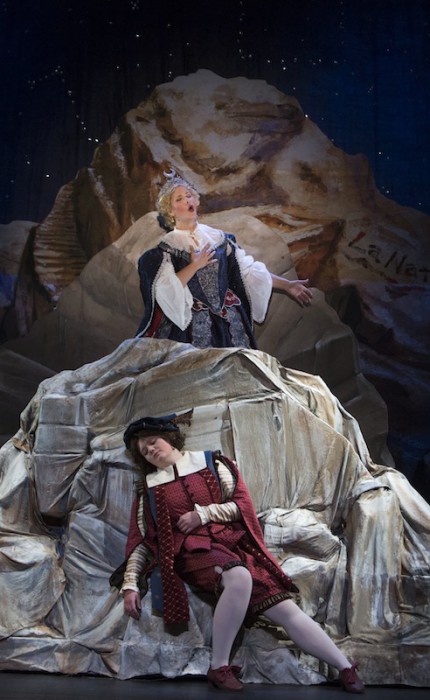Haymarket Opera scores big with imaginative “La Calisto”

Now in their fifth season of bringing historically informed productions of early opera to appreciative local audiences, Chicago’s Haymarket Opera Company is moving up. Friday night’s performance of Francisco Cavalli’s seldom-heard 1651 masterwork La Calisto took over the 900-seat Athenaeum Theatre and filled the space with superb music and imaginative production values.
Though far from a full house, there was a substantial audience for the three-hour comedic retelling of the spicy myth of Jupiter’s affair with Calisto, chaste follower of the goddess Diana. The story is enlivened by various subplots and twists, which sometimes get a bit mystifying. But the performances of the large cast was so satisfying musically and dramatically in the hands of stage director Sarah Edgar and musical director Craig Trompeter that all was forgiven in the spirit of the occasion.
Perhaps the most problematic element is the double casting of the roles of Diana, the goddess, and Jupiter masquerading as Diana to seduce Calisto. The immensely talented Angela Young Smucker takes on both parts with verve and the love affair of Jupiter-as-Diana and Calisto (a radiant Chelsea Morris Shephard) is handled tastefully and believably. As the plot unfolds, however, it is a little challenging to remember which Diana we are seeing at any moment.
Francisco Cavalli lived from 1602 to 1676, and was one of the most important Venetian composers after Monteverdi. He wrote over 30 operas and La Calisto was his biggest failure. It took a twentieth-century perspective to appreciate the many felicities of this complex work. The glue that holds it all together is the collaboration of composer and librettist. Giovanni Faustini wrote many libretti for Cavalli and Trompeter compares their work to that of Mozart and Da Ponte, Gilbert and Sullivan and Rogers and Hammerstein.
From the opening Prologue, a symbolic meeting of Nature, Eternity and Destiny who set the plot in motion accompanied by a huge snake devouring itself (an authentic touch), the tone is set: ambitious baroque staging and richly musical word-coloring.
Jupiter (melodious baritone Aaron Wardell) and his messenger Mercury (a campy Ryan De Ryke) open the opera as the king of the gods is enchanted by the virgin follower of Diana, Calisto and resolves to possess her. Mercury advises Jove that deception is the best play in the game of love and suggests that he disguise himself as Diana to gain the nymph’s love. This ploy works and sets off many consequences.
For one thing, Diana is already in love with Endimione, a shepherd, played by a warm-toned Lindsey Adams. Another character involved in this subplot is Linfea (Nathalie Colas, a standout in acting and voice) who chases Endimione away to Diana’s displeasure.
The real Diana rejects Calisto who is devastated. Other characters, goat-like Pan (fine comic tenor Patrick Muehleise) and his two Pan-like partners (notably Kaitlin Foley as Satirino) join the action. The plots unfold and musical highlights include a lament worthy of Purcell and a beautiful hymn to the moon sung by Endimione.
This production is a model of historic reconstruction, with little omitted or added. The period-instrument ensemble of strings, harpsichords and theorbo, found just the right balance with the mid-sized voices, and were fluent in the many gorgeous ritornelli used as introductions and scene changers. The scholarly work of Jennifer Williams Brown was exemplary in recreating a performance as staged in Cavalli’s day while leaving room for the musical and humorous improvisations that bring the work to life for a modern audience.
The one major character to be introduced late in the plot is the vengeful Juno who is superbly sung by Kimberly McCord. The queen of the gods enacts her revenge by turning Calisto into a bear. This bit of action is smoothly done with a realistic-looking bear mask which is removed at the end. The various plots are wrapped up. In the final scene, Jove takes Callisto up to the starry heavens to show her where she will be for all eternity known as Ursus Major and the opera ends briskly.
La Calisto will be repeated 2 p.m. Sunday. haymarketopera.org
Posted in Uncategorized





Posted May 07, 2016 at 10:34 pm by Cianne
A tip for keeping the Dianas straight: Real Diana wears a tiara with a crescent moon. Jove as Diana wears a crown topped with a large white plume with some red plumes underneath.